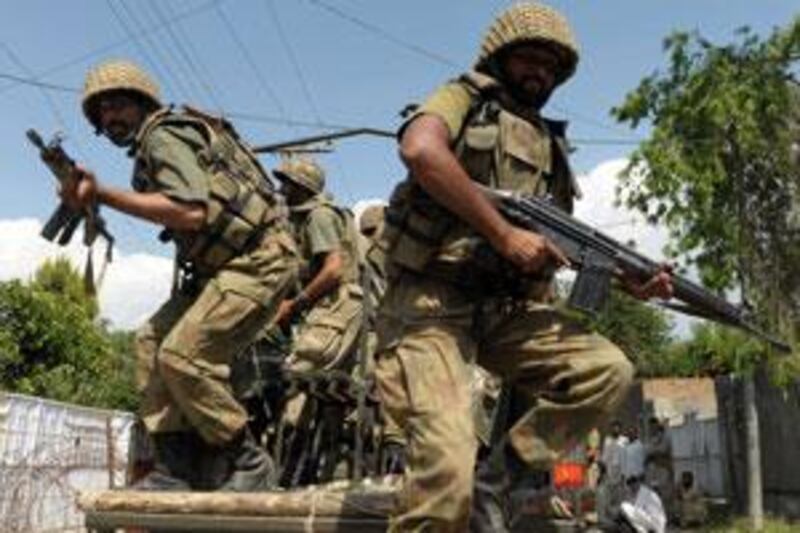ISLAMABAD // The Taliban have abandoned their positions in the Swat Valley's main town of Mingora under the advance of the Pakistani army, delivering the military a strategic prize in its offensive against militants in the country's Northwest, according to army commanders. Taliban fighters had dug themselves into bunkers built into hotels and government buildings in Mingora, and initially offered stiff resistance as troops first closed roads leading to the town and then began moving in earlier this week, army spokesman Maj Gen Athar Abbas said. Pakistan's defence secretary said Sunday that the military operations in the Swat Valley "have met almost complete success...Only five to 10 per cent job is left and over the next two or three days this area will be cleared," Lt Gen (Ret) Syed Athar Ali told an annual meeting of defence ministers, officials and experts in Singapore.
Aid was being distributed Saturday to some of the estimated 20,000 people who were trapped in Mingora, and water and gas supplies were being restored. But Mr Abbas said it would be at least two weeks before power is switched back on, and refugees were not yet being encouraged to start returning to their homes. About three million people have fled the fighting in Swat, and the exodus has raised fears of a humanitarian crisis.
Mr Abbas said an unknown number of militant fighters were able to escape Mingora, raising the prospect that they could continue the fight elsewhere. The military launched a major offensive about one month ago in the Swat Valley and neighbouring areas to oust Taliban militants who had been extending their control over the Northwestern region near the border with Afghanistan. US and other officials say the lawless border region is being used by al Qa'eda and the Taliban as a base to plan and launch attacks on Western forces in Afghanistan, and see the offensive as a test of Pakistan's resolve to fight extremism on its soil.
Government troops had been advancing steadily into the Swat region for about a month, bombarding towns from the air and fighting house-to-house with Taliban gunmen in some places. "When they realized that if they did not leave these areas the noose would tighten around them and they would not find a way to leave," Mr Abbas said. Information Minister Qamar Zaman Kaira said the number of people uprooted from their homes by the fighting had reached "around three million", and that more than 190,000 of them were living in refugee camps. The rest are staying with relatives or relying on goodwill from local residents.
The widespread domestic support for the campaign so far could sour if the government is perceived to have failed the refugees, or if a high number of civilian casualties is revealed. Mr Abbas said an emergency medical team had been flown to Mingora and would work to reopen the town's hospital and treat civilians wounded in the fighting. The Taliban has warned it will launch terrorist strikes in Pakistani cities in retaliation for the campaign, and claimed responsibility for last Wednesday's gun and suicide bomb attack in the eastern city of Lahore that killed at least 30 people. A day later, three suicide bombings killed at least 14 people in two cities in the Northwest. Mr Abbas said on Saturday that 1,217 militants have been killed in the Swat offensive and 79 arrested, and 81 soldiers have died. The military has not released civilian casualty numbers and says all care is being taken to protect the innocent.
* AP





